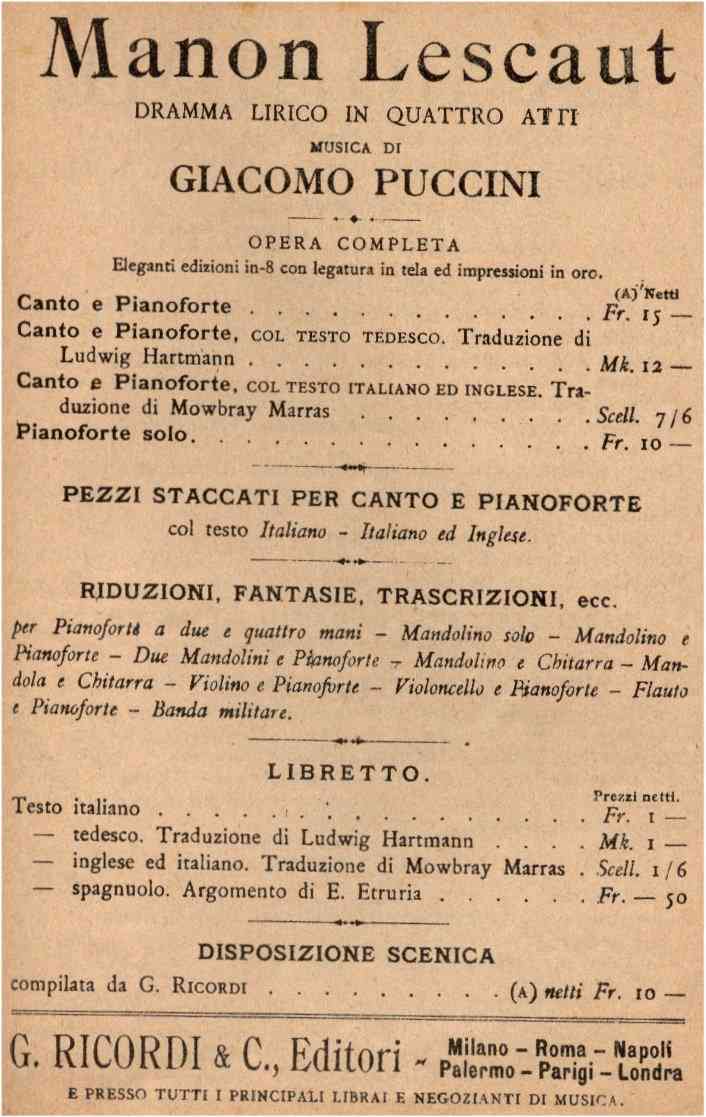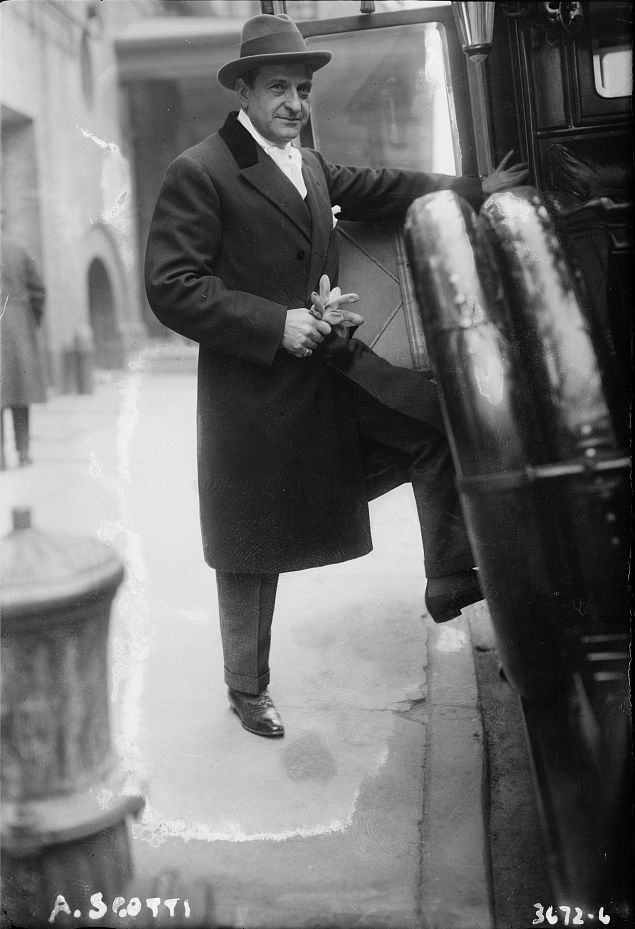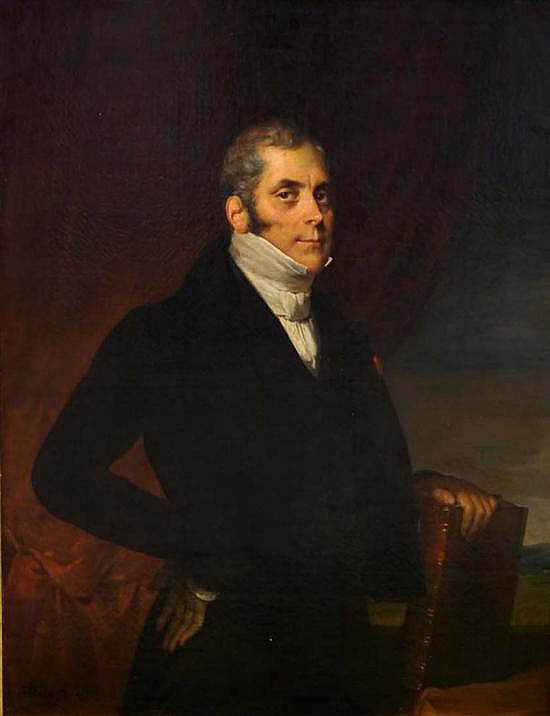|
Manon Lescaut (Puccini)
''Manon Lescaut'' () is an Italian-language opera in four acts composed by Giacomo Puccini between 1889 and 1892 to a libretto by Luigi Illica, Marco Praga and , based on the 1731 novel '' Histoire du Chevalier des Grieux, et de Manon Lescaut'' by the Abbé Prévost. The opera was first performed in 1893 in Turin, at the Teatro Regio. Composition history The libretto is in Italian, and was cobbled together by five librettists whom Puccini employed: Ruggero Leoncavallo, Marco Praga, Giuseppe Giacosa, and Luigi Illica. The publisher, Giulio Ricordi, and the composer himself also contributed to the libretto. So confused was the authorship of the libretto that no one was credited on the title page of the original score. However, it was Illica and Giacosa who completed the libretto and went on to contribute the libretti to Puccini's next three – and most successful – works, ''La Bohème'', ''Tosca'' and ''Madama Butterfly''. Puccini took some musical elements in ''Manon Lesca ... [...More Info...] [...Related Items...] OR: [Wikipedia] [Google] [Baidu] |
Opera
Opera is a form of theatre in which music is a fundamental component and dramatic roles are taken by singers. Such a "work" (the literal translation of the Italian word "opera") is typically a collaboration between a composer and a librettist and incorporates a number of the performing arts, such as acting, scenery, costume, and sometimes dance or ballet. The performance is typically given in an opera house, accompanied by an orchestra or smaller musical ensemble, which since the early 19th century has been led by a conductor. Although musical theatre is closely related to opera, the two are considered to be distinct from one another. Opera is a key part of the Western classical music tradition. Originally understood as an entirely sung piece, in contrast to a play with songs, opera has come to include numerous genres, including some that include spoken dialogue such as '' Singspiel'' and '' Opéra comique''. In traditional number opera, singers employ two styles of ... [...More Info...] [...Related Items...] OR: [Wikipedia] [Google] [Baidu] |
Madrigal (music)
A madrigal is a form of secular vocal music most typical of the Renaissance music, Renaissance (15th–16th c.) and early Baroque music, Baroque (1600–1750) periods, although revisited by some later European composers. The Polyphony, polyphonic madrigal is Accompaniment, unaccompanied, and the number of voices varies from two to eight, but usually features three to six voices, whilst the Metre (music), metre of the madrigal varies between two or three tercets, followed by one or two couplets. Unlike the verse-repeating strophic forms sung to the same music, most madrigals are through-composed, featuring different music for each stanza of lyrics, whereby the composer expresses the emotions contained in each line and in single words of the poem being sung. As written by Italianized Franco–Flemish composers in the 1520s in music, 1520s, the madrigal partly originated from the three-to-four voice frottola (1470–1530); partly from composers' renewed interest in poetry written in ... [...More Info...] [...Related Items...] OR: [Wikipedia] [Google] [Baidu] |
Alessandro Pomè
Alessandro is both a given name and a surname, the Italian form of the name Alexander. Notable people with the name include: People with the given name Alessandro * Alessandro Allori (1535–1607), Italian portrait painter * Alessandro Baricco (born 1958), Italian novelist * Alessandro Bega (born 1991), Italian tennis player * Alessandro Bordin (born 1998), Italian footballer * Alessandro Botticelli (1445–1510), Italian painter * Alessandro Bovo (born 1969), Italian water polo player * Alessandro Cagliostro (1743–1795), alias of occultist and adventurer Giuseppe Balsamo * Alessandro Calcaterra (born 1975), Italian water polo player * Alessandro Calvi (born 1983), Italian swimmer * Alessandro Cattelan (born 1980), Italian television preesenter * Alessandro Cortini (born 1976), Italian musician * Alessandro Criscuolo (1937–2020), Italian judge * Alessandro Del Piero (born 1974), Italian footballer * Alessandro Di Munno (born 2000), Italian footballer * Alessandro Evangelisti ... [...More Info...] [...Related Items...] OR: [Wikipedia] [Google] [Baidu] |
Voice Type
A voice type is a group of voices with similar vocal ranges, capable of singing in a similar tessitura, and with similar vocal transition points ('' passaggi''). Voice classification is most strongly associated with European classical music, though it, and the terms it utilizes, are used in other styles of music as well. A singer will choose a repertoire that suits their voice. Some singers such as Enrico Caruso, Rosa Ponselle, Joan Sutherland, Maria Callas, Jessye Norman, Ewa Podleś, and Plácido Domingo have voices that allow them to sing roles from a wide variety of types; some singers such as Shirley Verrett and Grace Bumbry change type and even voice part over their careers; and some singers such as Leonie Rysanek have voices that lower with age, causing them to cycle through types over their careers. Some roles are hard to classify, having very unusual vocal requirements; Mozart wrote many of his roles for specific singers who often had remarkable voices, and some of ... [...More Info...] [...Related Items...] OR: [Wikipedia] [Google] [Baidu] |
Manon Lescaut Costume Manon Act II
''Manon'' () is an ''opéra comique'' in five acts by Jules Massenet to a French libretto by Henri Meilhac and Philippe Gille, based on the 1731 novel '' L'histoire du chevalier des Grieux et de Manon Lescaut'' by the Abbé Prévost. It was first performed at the Opéra-Comique in Paris on 19 January 1884, with sets designed by Eugène Carpezat (act 1), Auguste Alfred Rubé and Philippe Chaperon (acts 2 and 3), and Jean-Baptiste Lavastre (act 4). Prior to Massenet's work, Halévy (''Manon Lescaut'', ballet, 1830) and Auber (''Manon Lescaut'', opéra comique, 1856) had used the subject for musical stage works. Massenet also wrote a one-act sequel to ''Manon'', ''Le portrait de Manon'' (1894), involving the Chevalier des Grieux as an older man. The composer worked at the score of ''Manon'' at his country home outside Paris and also at a house at The Hague once occupied by Prévost himself. ''Manon'' is Massenet's most popular and enduring opera and, having "quickly conquered th ... [...More Info...] [...Related Items...] OR: [Wikipedia] [Google] [Baidu] |
Arturo Vigna
Arturo is a Spanish and Italian variant of the name Arthur. People *Arturo Álvarez (footballer, born 1985), American-born Salvadoran footballer * Arturo Álvarez (footballer, born 1959), Mexican footballer * Arthuro Henrique Bernhardt (b. 1982), Brazilian football (soccer) player *Arturo Brachetti (born 1957), Italian quick-change artist *Arturo Bragaglia (1893–1962), Italian actor * Arturo Bravo (born 1958), Mexican racewalker * Arturo Casadevall (born 1957), American physician *Arturo Castro (Mexican actor) (1918–1975), Mexican actor *Arturo Castro (Guatemalan actor), Guatemalan actor * Arturo Corvalán (born 1978), Chilean road cyclist * Arturo De Vecchi (1898–1988), Italian fencer *Arturo Di Modica (1941–2021), Italian-born American artist * Arturo Di Napoli (born 1974), Italian soccer (UK: football) coach *Arturo Dominici (1918–1992), Italian actor and dubbing artist * Arturo Freeman, American football player *Arturo Frondizi (1908–1995), 35th President of Argentin ... [...More Info...] [...Related Items...] OR: [Wikipedia] [Google] [Baidu] |
Antonio Scotti
Antonio Scotti (25 January 1866 – 26 February 1936) was an Italian baritone. He was a principal artist of the New York Metropolitan Opera for more than 33 seasons, but also sang with great success at London's Royal Opera House, Covent Garden, and Milan's La Scala. Life Antonio Scotti was born in Naples, Italy. His family wanted him to enter the priesthood but he embarked instead on a career in opera. He received his early vocal training from Esther Trifari-Paganini and Vincenzo Lombardi. According to most sources, he made his debut at Malta's Theatre Royal in 1889, performing the role of Amonasro in Giuseppe Verdi's ''Aida''. Engagements at various Italian operatic venues ensued and he later gained valuable stage experience singing in Spain, Portugal, Russia and South America (Buenos Aires from 1891 to 1894 and again 1897; Río de Janeiro 1893 and Chile 1898; he also sung in Montevideo). In 1898, he debuted at Italy's most renowned opera house, La Scala, Milan, as Hans Sachs in ... [...More Info...] [...Related Items...] OR: [Wikipedia] [Google] [Baidu] |
Enrico Caruso
Enrico Caruso (, , ; 25 February 1873 – 2 August 1921) was an Italian operatic first lyrical tenor then dramatic tenor. He sang to great acclaim at the major opera houses of Europe and the Americas, appearing in a wide variety of roles (74) from the Italian and French repertoires that ranged from the lyric to the dramatic. One of the first major singing talents to be commercially recorded, Caruso made 247 commercially released recordings from 1902 to 1920, which made him an international popular entertainment star. Biography Early life Enrico Caruso came from a poor but not destitute background. Born in Naples in the via Santi Giovanni e Paolo n° 7 on 25 February 1873, he was baptised the next day in the adjacent Church of San Giovanni e Paolo. His parents originally came from Piedimonte d'Alife (now called Piedimonte Matese), in the Province of Caserta in Campania, Southern Italy. Caruso was the third of seven children and one of only three to survive infancy. There is ... [...More Info...] [...Related Items...] OR: [Wikipedia] [Google] [Baidu] |
Lina Cavalieri
Natalina "Lina" Cavalieri (25 December 1874 – 7 February 1944) was an Italian operatic dramatic soprano, actress, and monologist. Biography Lina Cavalieri was born on Christmas Day at Viterbo, some north of Rome. She lost her parents at the age of fifteen and became a ward of the state, sent to live in a Roman Catholic orphanage. The vivacious young girl was unhappy under the strict discipline of the nuns, and at the first opportunity she ran away with a touring theatrical group. At a young age, she made her way to Paris, France, where her appearance opened doors and she obtained work as a singer at one of the city's café-concerts. From there she performed at a variety of music halls and other such venues around Europe, while still working to develop her voice. She took voice lessons and made her opera debut in Lisbon, Portugal, in 1900 (as Nedda in ''Pagliacci''). The Russian Prince Alexander Bariatinsky was deeply in love with Lina, and they had an open affair, but never b ... [...More Info...] [...Related Items...] OR: [Wikipedia] [Google] [Baidu] |
Metropolitan Opera
The Metropolitan Opera (commonly known as the Met) is an American opera company based in New York City, resident at the Metropolitan Opera House at Lincoln Center, currently situated on the Upper West Side of Manhattan. The company is operated by the non-profit Metropolitan Opera Association, with Peter Gelb as general manager. As of 2018, the company's current music director is Yannick Nézet-Séguin. The Met was founded in 1883 as an alternative to the previously established Academy of Music opera house, and debuted the same year in a new building on 39th and Broadway (now known as the "Old Met"). It moved to the new Lincoln Center location in 1966. The Metropolitan Opera is the largest classical music organization in North America. Until 2019, it presented about 27 different operas each year from late September through May. The operas are presented in a rotating repertory schedule, with up to seven performances of four different works staged each week. Performances are ... [...More Info...] [...Related Items...] OR: [Wikipedia] [Google] [Baidu] |
Manon Lescaut (Auber)
''Manon Lescaut'' is an opera or opéra comique in three acts by Daniel Auber to a libretto by Eugène Scribe, and, like Puccini's ''Manon Lescaut'' and Massenet's '' Manon'', is based on the Abbé Prévost's novel ''Manon Lescaut'' (1731). Auber's version is nowadays the least-performed of the three. Performance history The opera was premiered on 23 February 1856 by the Opéra-Comique at the second Salle Favart in Paris. It was the first work to be staged by that company that did not have a happy ending. It was staged in Liège in 1875, revived at the Opéra-Comique in 1882,Loewenberg, col. 920 and regularly performed in Germany as well as France. However, since the dawn of the twentieth century stagings have become something of a rarity. In North America, the opera was performed in 2006 by the Lyric Opera of Los Angeles at the Los Angeles Theatre. In 1990, it was staged at the Opéra Comique de Paris with the Picardy Sinfonietta in Amiens conducted by Patrick Fournill ... [...More Info...] [...Related Items...] OR: [Wikipedia] [Google] [Baidu] |
Daniel Auber
Daniel-François-Esprit Auber (; 29 January 178212 May 1871) was a French composer and director of the Paris Conservatoire. Born into an artistic family, Auber was at first an amateur composer before he took up writing operas professionally when the family's fortunes failed in 1820. He soon established a professional partnership with the librettist Eugène Scribe that lasted for 41 years and produced 39 operas, most of them commercial and critical successes. He is mostly associated with opéra-comique and composed 35 works in that genre. With Scribe he wrote the first French grand opera, ''La Muette de Portici'' (The Dumb Woman of Portici) in 1828, which paved the way for the large-scale works of Giacomo Meyerbeer. Auber held two important official musical posts. From 1842 to 1871 he was director of France's premier music academy, the Paris Conservatoire, which he expanded and modernised. From 1852 until the fall of the Second Empire in 1870 he was director of the imperial chap ... [...More Info...] [...Related Items...] OR: [Wikipedia] [Google] [Baidu] |






.jpg)

